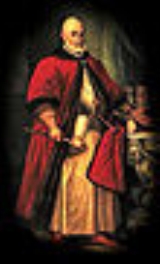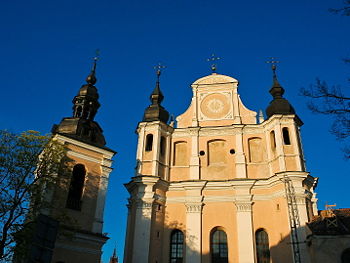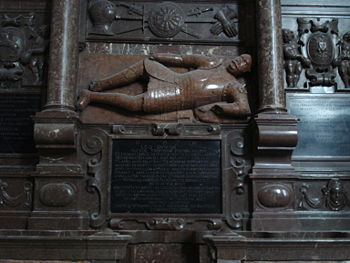
Lew Sapieha
Encyclopedia
Lew Sapieha . He was born in Astrouna , near Vitsebsk, Belarus
. He became Great Secretary of the Grand Duchy of Lithuania
in 1580, Great Clerk of the Grand Duchy in 1581, Court Chancellor of the GDL in 1585, Grand Chancellor of the GDL from 1589 until 1623, Voivode of Vilnius in 1621, Great Lithuanian Hetman in 1623 and starost of Slonim
, Brest
and Mogilev
.
Lew is considered as a great political figure of the Polish-Lithuanian Commonwealth
. A rich and powerful magnate
, he was known for his wisdom as a statesman, lawyer and military commander, he was one of the greatest leaders of the Grand Duchy of Lithuania
at the times of the Duchy's highest cultural flourishing.
He was educated in Leipzig
and worked in the royal chancellery of King of Poland and Grand Duke of Lithuania Stefan Batory
under direction of Jan Zamoyski
. Raised Eastern Orthodox, in his youth he converted to Calvinism
and founded a number of Calvinist churches in his former estates. In the 1570s he turned to Unitarianism
. Disillusioned by the squabbles within the Protestant camp, in 1586 he converted with his first wife to Roman Catholicism of which he became a zealous defender. After the Union of Brest
he enforced conformity on the unwilling Eastern Orthodox.
He supported a political union with Muscovy in 1584–1600 and led the diplomatic mission
to Moscow
in 1600 that proposed the union to tzar Boris Godunov
, who declined the proposal.
He also participated in wars with Muscovy under rule of Stefan Batory
and King of Poland and Grand Duke of Lithuania Sigismund III Vasa
.
He became an adviser of Sigismund III Vasa
and supported his plans to take over the Muscovite throne.
As Chancellor he was the main editor and publisher of the last version of the Statute of the Grand Duchy of Lithuania
, considered to be the first Constitution
in Europe
. He laid grounds for the establishment of the Law Faculty in the University of Vilnius, which was created in 1641.
He was co-initiator and a participant in the military expedition to Moscow
in 1618 by King of Poland and Grand Duke of Lithuania Vladislaus IV .
As Sejm Marshal he led the ordinary Sejm
in Warsaw
from October 4 to November 25, 1582. He was a benefactor of many catholic churches in the Grand Duchy. He established the long-term power and wealth of the Sapieha family
.
Sapieha died on 1633 and was interred in the cellars of the Church of St. Michael the Archangel in Vilnius, which he himself has commissioned. His tomb remains there to the present day and is still the largest piece of art of its kind in the territory of Lithuania.


Belarus
Belarus , officially the Republic of Belarus, is a landlocked country in Eastern Europe, bordered clockwise by Russia to the northeast, Ukraine to the south, Poland to the west, and Lithuania and Latvia to the northwest. Its capital is Minsk; other major cities include Brest, Grodno , Gomel ,...
. He became Great Secretary of the Grand Duchy of Lithuania
Grand Duchy of Lithuania
The Grand Duchy of Lithuania was a European state from the 12th /13th century until 1569 and then as a constituent part of Polish-Lithuanian Commonwealth until 1791 when Constitution of May 3, 1791 abolished it in favor of unitary state. It was founded by the Lithuanians, one of the polytheistic...
in 1580, Great Clerk of the Grand Duchy in 1581, Court Chancellor of the GDL in 1585, Grand Chancellor of the GDL from 1589 until 1623, Voivode of Vilnius in 1621, Great Lithuanian Hetman in 1623 and starost of Slonim
Slonim
Slonim is a city in Hrodna Voblast, Belarus, capital of the Slonim District. It is located at the junction of the Shchara and Isa rivers, 143 km southeast of Hrodna. The population in 2008 was 50,800.-Etymology and historical names:...
, Brest
Brest, Belarus
Brest , formerly also Brest-on-the-Bug and Brest-Litovsk , is a city in Belarus at the border with Poland opposite the city of Terespol, where the Bug River and Mukhavets rivers meet...
and Mogilev
Mogilev
Mogilev is a city in eastern Belarus, about 76 km from the border with Russia's Smolensk Oblast and 105 km from the border with Russia's Bryansk Oblast. It has more than 367,788 inhabitants...
.
Lew is considered as a great political figure of the Polish-Lithuanian Commonwealth
Polish-Lithuanian Commonwealth
The Polish–Lithuanian Commonwealth was a dualistic state of Poland and Lithuania ruled by a common monarch. It was the largest and one of the most populous countries of 16th- and 17th‑century Europe with some and a multi-ethnic population of 11 million at its peak in the early 17th century...
. A rich and powerful magnate
Magnate
Magnate, from the Late Latin magnas, a great man, itself from Latin magnus 'great', designates a noble or other man in a high social position, by birth, wealth or other qualities...
, he was known for his wisdom as a statesman, lawyer and military commander, he was one of the greatest leaders of the Grand Duchy of Lithuania
Grand Duchy of Lithuania
The Grand Duchy of Lithuania was a European state from the 12th /13th century until 1569 and then as a constituent part of Polish-Lithuanian Commonwealth until 1791 when Constitution of May 3, 1791 abolished it in favor of unitary state. It was founded by the Lithuanians, one of the polytheistic...
at the times of the Duchy's highest cultural flourishing.
He was educated in Leipzig
Leipzig
Leipzig Leipzig has always been a trade city, situated during the time of the Holy Roman Empire at the intersection of the Via Regia and Via Imperii, two important trade routes. At one time, Leipzig was one of the major European centres of learning and culture in fields such as music and publishing...
and worked in the royal chancellery of King of Poland and Grand Duke of Lithuania Stefan Batory
Stefan Batory
Stephen Báthory was a Hungarian noble Prince of Transylvania , then King of Poland and Grand Duke of Lithuania . He was a member of the Somlyó branch of the noble Hungarian Báthory family...
under direction of Jan Zamoyski
Jan Zamoyski
Jan Zamoyski , was a Polish-Lithuanian nobleman, magnate, 1st duke/ordynat of Zamość. Royal Secretary since 1566, Lesser Kanclerz ) of the Crown since 1576, Lord Grand-Chancellor of the Crown since 1578, and Grand Hetman of the Crown since 1581...
. Raised Eastern Orthodox, in his youth he converted to Calvinism
Calvinism
Calvinism is a Protestant theological system and an approach to the Christian life...
and founded a number of Calvinist churches in his former estates. In the 1570s he turned to Unitarianism
Unitarianism
Unitarianism is a Christian theological movement, named for its understanding of God as one person, in direct contrast to Trinitarianism which defines God as three persons coexisting consubstantially as one in being....
. Disillusioned by the squabbles within the Protestant camp, in 1586 he converted with his first wife to Roman Catholicism of which he became a zealous defender. After the Union of Brest
Union of Brest
Union of Brest or Union of Brześć refers to the 1595-1596 decision of the Church of Rus', the "Metropolia of Kiev-Halych and all Rus'", to break relations with the Patriarch of Constantinople and place themselves under the Pope of Rome. At the time, this church included most Ukrainians and...
he enforced conformity on the unwilling Eastern Orthodox.
He supported a political union with Muscovy in 1584–1600 and led the diplomatic mission
Diplomatic mission
A diplomatic mission is a group of people from one state or an international inter-governmental organisation present in another state to represent the sending state/organisation in the receiving state...
to Moscow
Moscow
Moscow is the capital, the most populous city, and the most populous federal subject of Russia. The city is a major political, economic, cultural, scientific, religious, financial, educational, and transportation centre of Russia and the continent...
in 1600 that proposed the union to tzar Boris Godunov
Boris Godunov
Boris Fyodorovich Godunov was de facto regent of Russia from c. 1585 to 1598 and then the first non-Rurikid tsar from 1598 to 1605. The end of his reign saw Russia descend into the Time of Troubles.-Early years:...
, who declined the proposal.
He also participated in wars with Muscovy under rule of Stefan Batory
Stefan Batory
Stephen Báthory was a Hungarian noble Prince of Transylvania , then King of Poland and Grand Duke of Lithuania . He was a member of the Somlyó branch of the noble Hungarian Báthory family...
and King of Poland and Grand Duke of Lithuania Sigismund III Vasa
Sigismund III Vasa
Sigismund III Vasa was King of Poland and Grand Duke of Lithuania, a monarch of the united Polish–Lithuanian Commonwealth from 1587 to 1632, and King of Sweden from 1592 until he was deposed in 1599...
.
He became an adviser of Sigismund III Vasa
Sigismund III Vasa
Sigismund III Vasa was King of Poland and Grand Duke of Lithuania, a monarch of the united Polish–Lithuanian Commonwealth from 1587 to 1632, and King of Sweden from 1592 until he was deposed in 1599...
and supported his plans to take over the Muscovite throne.
As Chancellor he was the main editor and publisher of the last version of the Statute of the Grand Duchy of Lithuania
Statutes of Lithuania
The Statutes of Lithuania originally known as the Statutes of the Grand Duchy of Lithuania were a 16th century codification of all the legislation of the Grand Duchy of Lithuania and its successor, the Polish–Lithuanian Commonwealth...
, considered to be the first Constitution
Constitution
A constitution is a set of fundamental principles or established precedents according to which a state or other organization is governed. These rules together make up, i.e. constitute, what the entity is...
in Europe
Europe
Europe is, by convention, one of the world's seven continents. Comprising the westernmost peninsula of Eurasia, Europe is generally 'divided' from Asia to its east by the watershed divides of the Ural and Caucasus Mountains, the Ural River, the Caspian and Black Seas, and the waterways connecting...
. He laid grounds for the establishment of the Law Faculty in the University of Vilnius, which was created in 1641.
He was co-initiator and a participant in the military expedition to Moscow
Moscow
Moscow is the capital, the most populous city, and the most populous federal subject of Russia. The city is a major political, economic, cultural, scientific, religious, financial, educational, and transportation centre of Russia and the continent...
in 1618 by King of Poland and Grand Duke of Lithuania Vladislaus IV .
As Sejm Marshal he led the ordinary Sejm
Sejm
The Sejm is the lower house of the Polish parliament. The Sejm is made up of 460 deputies, or Poseł in Polish . It is elected by universal ballot and is presided over by a speaker called the Marshal of the Sejm ....
in Warsaw
Warsaw
Warsaw is the capital and largest city of Poland. It is located on the Vistula River, roughly from the Baltic Sea and from the Carpathian Mountains. Its population in 2010 was estimated at 1,716,855 residents with a greater metropolitan area of 2,631,902 residents, making Warsaw the 10th most...
from October 4 to November 25, 1582. He was a benefactor of many catholic churches in the Grand Duchy. He established the long-term power and wealth of the Sapieha family
Sapieha
The Sapieha is a Polish-Lithuanian princely family descending from the medieval boyars of Smolensk. The family acquired great influence in the sixteenth century.-History:...
.
Sapieha died on 1633 and was interred in the cellars of the Church of St. Michael the Archangel in Vilnius, which he himself has commissioned. His tomb remains there to the present day and is still the largest piece of art of its kind in the territory of Lithuania.


External links
KretingaKretinga
Kretinga is a city in the Klaipėda County, Lithuania. It is the capital of the Kretinga district municipality. It is located east of the popular Baltic Sea resort town of Palanga, and about north of Lithuania's 3rd largest city and principal seaport, Klaipėda.The population was listed as 21,423...

